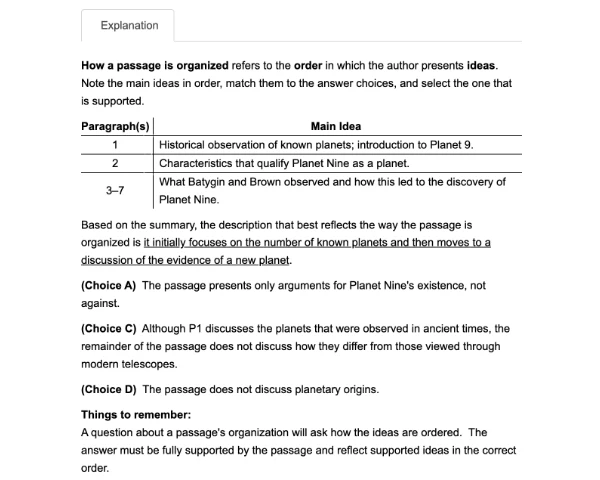UWorld's ACT Reading study tips offer essential advice on the content and strategies you need to ace exam day. This guide provides targeted tips, empowering you to confidently improve your comprehension skills and approach intricate details in passages. From deciphering subtle points to mastering effective study techniques, UWorld is your dedicated partner in conquering the ACT Reading test.
How to Study for the ACT Reading Section: Essential Steps
You've decided to take the ACT, and now it's time to jump into prepping for the Reading section. No matter how much time you have before test day, getting started with your ACT reading prep will undoubtedly lead to positive results. To make a solid ACT Reading study plan, start by thinking about the following 6 essential points:
How to Pass the ACT Reading Section
Achieving success in the ACT Reading section requires a holistic strategy. Begin by mastering key techniques, including familiarizing yourself with the test's format, developing effective time management, and employing active reading methods. To deepen your ACT reading prep, explore the following recommendations:
-
Develop a Reading Strategy
The ACT Reading section spans a broad spectrum of topics, including humanities, literary fiction, natural science, and social science. Acquainting yourself with this variety of subjects will better prepare you to tackle the extensive range of content presented.
-
Improving Your Reading Speed
Like any skill, reading faster requires consistent practice. Set aside time each day to read and gradually increase your reading speed. Guiding your eyes along the lines with a pointer can help maintain a consistent reading pace and reduce distractions. Learn to quickly skim a text to get the gist and scan for key information. Instead of reading word by word, try to read groups of words or phrases at a time.
-
Utilizing Practice Tests
Consistent and focused practice plays a vital role in sharpening your skills. Using practice tests from both official sources and other reliable platforms, such as UWorld's ACT Reading practice tests, helps replicate real exam conditions and identify areas for improvement. Regularly reviewing your performance on these tests refines your approach and boosts confidence.
How to Study On Your Own for the ACT Reading Section
Studying on your own, or self-studying for the ACT Reading section, involves a structured approach tailored to enhance your reading skills, comprehension, and test-taking strategies.
Here are some key techniques that will make studying for the ACT Reading section simple and help you feel prepared for the challenges:
-
Set a Study Schedule
- Create a study schedule that includes dedicated sessions set aside to focus on ACT Reading practice questions.
- Consistency and dedicated attention are key; keep study sessions short and focused. Aim for 20-30 minutes over the span of 3-6 months for deeper comprehension.
-
Become Familiar with the ACT Reading Format
- Familiarize yourself with the different types of passages and question formats in the ACT Reading section.
- Identify your strengths and weaknesses to tailor your study plan accordingly.
-
Engage in Active Reading
- Enhance your comprehension by actively engaging with the text. This involves taking notes, highlighting crucial points, and succinctly summarizing paragraphs. Even during weeks when your test prep shifts to other ACT sections, incorporate active reading techniques into your academic or leisure reading.
- Aim to condense the essence of each paragraph into two to three words to sharpen your understanding.
-
Focus on Building Vocabulary
- Improve your vocabulary by reading a variety of materials such as articles, books, and newspapers.
- Keep a vocabulary journal or use UWorld's digital tools to track and review new words regularly.
-
Utilize ACT Prep Materials
- Use online ACT practice tests and study materials to simulate the exam environment.
- Reviewing high-quality materials can give you a better grasp of the test structure.
-
Manage Your Time During Reading Comprehension
- Recreate test conditions by practicing reading passages and answering questions within the allotted time.
- Learn to prioritize questions and effectively manage your time.
Choosing to prepare for the ACT Reading section on your own is a smart decision, especially if you like the flexibility of being able to study at your own pace. Understanding and preparing for this test requires careful planning and effective strategies. Utilizing these techniques on how to study for ACT Reading can help you achieve your target score. We suggest creating a personalized study plan using our tailored ACT study plans. These plans are designed for you, allowing you to concentrate on 1 section at a time. Remember, consistent practice and intentionally planned study sessions are key to achieving your target score. Check out our ACT Study Plan to learn more about UWorld’s personalized study plans.
How Long Should You Study for the ACT Reading Section?
Finding the perfect study plan for the ACT can vary from person to person, but a good rule of thumb is to aim for 3 to 6 months of solid, regular study for the whole test, dedicating 1 session per week to the Reading section. The right amount of time depends on where you're starting from, the score you're aiming for, and how much time you can commit. Start by figuring out where you stand, set a goal that feels right for you, and then carve out some time each week to get down to business. Remember, it's all about consistency — short, focused study sessions with breaks in between work wonders for true learning. It's not just about how long you study but making each session count that will really prepare you for the test.
ACT Study Plans
Our personalized ACT Reading study plans help you build the skills you need to understand, analyze, and interpret a wide range of reading passages. These plans are tailored to your prep timeline, allowing you to strengthen your comprehension, pacing, and reasoning strategies in manageable steps.
With 6 months to prepare, you can systematically build reading stamina, fine-tune comprehension strategies, and develop the timing and confidence necessary to master ACT Reading.
Month 1: Establish a Baseline
- Take a full-length ACT and closely evaluate your Reading section results.
- Identify question types and passage types (literary narrative, humanities, social science, natural science) that are most difficult for you.
- Create a weekly schedule: 5 days/week, 1 hour/day.
- Spend one week on each passage type to become familiar with different reading styles.
Activities:
- Maintain a reading journal to log missed questions and patterns in errors.
- Practice active reading (underlining, summarizing, predicting).
- Review basic question types: main idea, detail, inference, vocabulary in context.
Month 2: Targeted Practice
- Focus 2-3 days/week on your weakest passage or question types.
- Alternate between timed and untimed drills to build strategy and accuracy.
- Take a full-length ACT every other weekend.
Activities:
- Use annotation strategies to enhance comprehension.
- Practice answering without rereading the passage in full.
- Track and improve time-per-passage.
Month 3: Advanced Strategies
- Explore high-level techniques: skimming, strategic underlining, answering as you read.
- Mix passage types and question types in your practice sets.
- Take 2 full-length Reading section tests under strict time conditions.
Activities:
- Create your own questions and summaries for passages.
- Learn how to eliminate trap answers efficiently.
- Time yourself reading and answering each passage to the second.
Month 4: Simulated Practice
- Take 1 full-length ACT per week, with focused Reading analysis.
- On alternate days, complete full Reading sections or passage sets.
- Reserve one day weekly for rest and review.
Activities:
- Compare your pacing across different passage types.
- Evaluate answer changes — are you second-guessing correct responses?
- Test strategies like reading questions first vs. reading the passage first.
Month 5: Polish and Review
- Revisit early mistakes and reflect on improvements.
- Use official ACT Reading materials for timed practice.
- Take 2 full ACTs, allowing five days between for review.
Activities:
- Summarize strategies in a cheat sheet format.
- Practice explaining why incorrect answers are wrong.
- Read opinion pieces or articles to build comprehension speed.
Month 6: Refine for Peak Performance
- Weeks 1-2: One full ACT per weekend; light daily review on weekdays.
- Weeks 3-4: Light review only; focus on confidence and maintaining pacing.
- Test Week: Read lightly for practice, avoid over-preparing. Focus on rest and mental prep.
With 3 months, you can develop a consistent reading routine, strengthen core strategies, and improve comprehension under time pressure.
Month 1: Identify and Build
- Take a full-length ACT Reading section and assess your performance.
- Dedicate ~1 hour per day to ACT-style passages, explanation review, and journaling.
- Alternate passage types each week. Spend extra time on the one you struggle with the most.
- Take a full-length ACT each weekend to build stamina.
Month 2: Sharpen Strategies
- Focus on difficult question types: inference, function, dual passage comparisons.
- Develop strategies like scanning for keywords, mapping passage structure.
- Take a Reading section or full ACT test every other weekend.
Month 3: Simulate and Solidify
- Practice full timed Reading sections weekly.
- Prioritize accuracy and pacing — use your error journal to avoid repeat mistakes.
- Avoid learning new strategies; instead, review and refine your existing approach.
Weeks 1-2: Focus on Weaknesses
- Identify which passage types or question types cost you the most points.
- Practice those in sets, using explanations to reinforce understanding.
- Limit time spent on strong areas to 1–2 days max.
- Continue journaling errors and tracking time-per-passage.
Weeks 3-4: Hone Test Skills
- Complete full-length Reading sections under timed conditions.
- Focus on your reading speed and decision-making for tricky questions.
- Review old notes and mistakes. Don’t introduce new strategies.
- Prioritize getting a good night’s sleep before your test.
Check out our One-Month Study Plan for the ACT to get more help with improving your score.
Week 1: Target Your Weak Areas
- Start with a timed ACT Reading section to identify weak areas.
- Dedicate 1 hour daily to ACT-style reading practice and explanation reviews.
- Focus on your weakest question types and improve pacing.
- Use a reading journal to identify patterns.
Week 2: Practice with Purpose
- Take at least one full-length ACT Reading section.
- Focus on refining your strategy — avoid new methods.
- Lightly review summaries and key takeaways from previous prep.
- Sleep well and stay confident heading into test day.

ACT Reading Tips: Achieving a Perfect 36
Achieving a perfect 36 on the ACT Reading section is an ambitious goal, but with consistent practice and proactive skill-building, it’s within reach. Here are targeted advanced tips to help you elevate your score:
How to approach ACT Reading passages
Effectively navigating ACT Reading passages involves a step-by-step strategy. Begin by briefly scanning the passage to grasp its structure and main ideas. Then, dive deeper to identify central themes and supporting details. Understand the author's tone and purpose, using annotations to clarify your understanding. Predict answers based on your comprehension and strategically prioritize questions. Manage your time wisely, allocating around 8-9 minutes per passage.
How Long Should You Spend on Each ACT Reading Passage?
Effective time management is crucial for success in the ACT Reading section. The actual ACT Reading Test consists of 40 questions that must be answered within a total of 35 minutes1. Ideally, allocate approximately 8-9 minutes for each reading passage. This strategic approach allows you to thoroughly navigate the passage and answer the associated questions within the given time frame.
Practicing this approach during your ACT reading prep is essential. Time yourself while working through practice tests or sample passages to develop a sense of pacing. This ensures you can successfully navigate all the passages within the time constraints.
How can you improve your reading speed on the ACT?
To read faster on the ACT while still understanding the content, it’s important to find a balance between speed and comprehension. Here are some strategies to help you read faster without sacrificing understanding:
- Preview the Passage: Before diving into the details, take a glance at the structure of the passage². Identify headings, subheadings, and any formatting that may guide your understanding. This preview sets the stage for more efficient reading.
- Eliminate Subvocalization: Subvocalization, or silently pronouncing words in your mind, can slow down your reading pace. Work on reducing this habit by consciously visualizing the concepts instead of mentally articulating each word.
- Use a Pointer or Guide: Experiment with using your finger or a pen to guide your eyes along the lines. This physical connection can help you maintain a steady pace and prevent regression, resulting in smoother and faster reading.
- Prioritize Important Information: Differentiate between essential and supplementary information. Focus on grasping the main ideas and critical details, as this selective approach can help you comprehend faster without getting bogged down by every detail.
- Chunk Information: Train your mind to process information in chunks rather than word by word. Expanding your field of vision can allow you to capture more content at once, enhancing your overall reading speed.
- Consistent Practice: Like any skill, improving reading speed requires consistent practice. Incorporate speed-reading techniques into your daily study routine, gradually increasing the complexity of the passages.
- Time Yourself: Implement timed reading exercises during practice sessions. Set specific time limits for passages and gradually decrease them as you become more proficient. This technique not only improves speed but also instills a sense of urgency.
ACT Reading Test Study Tips
Get to know how the ACT Reading test works and set up a routine for your studies. Explore different kinds of reading materials to get a good grasp of various subjects. Try real practice tests, be smart about your time, and learn from your mistakes. UWorld's ACT practice tests provide an excellent resource for comprehensive preparation. Work on your vocabulary to tackle tricky passages with ease. Use active reading techniques such as underlining important details. Take the time to go through helpful materials like study guides and online resources. These tricks are your secret weapons — they'll boost your confidence and help you nail the ACT Reading section.
Take high-quality practice tests
Taking high-quality practice tests is essential for achieving success while preparing for the ACT. These tests can help you become familiar with the test format, identify your strengths and weaknesses, and refine your test-taking strategies. UWorld's ACT practice tests are an excellent resource for comprehensive preparation. They provide realistic and challenging questions that simulate the actual exam environment, enabling you to assess your readiness accurately.
To access full-length ACT practice tests and dive deeper into effective test preparation, check out our ACT Practice Tests - Full Length.
Review/Study Materials
When preparing for the ACT, it’s smart to mix up your study tools. Alongside the official ACT prep and Khan Academy's free resources, UWorld's ACT test prep is a fantastic option if you are aiming for a perfect ACT reading score. Our ACT Question Bank offers challenging practice questions designed to make the real exam feel easy. Our thorough explanations for each answer option help you grasp why each is right or wrong, making your study sessions more than just practice — they become a deep dive into understanding the material.
What's more, UWorld is flexible. You can customize your practice to focus on the topics you find tricky or the areas you want to ace, ensuring your study time is as effective as possible. This way, you can really get to grips with your strengths and weaknesses and fine-tune your exam strategy.

References
- 1(2024). Reading Test Tips. Act.org Retrieved April 4, 2025 from https://www.act.org/content/act/en/products-and-services/the-act/test-preparation/reading-practice-test-questions.html?page=0&chapter=4
- 2(2024). Reading Test Description for the ACT. Act.org Retrieved April 4, 2025 from https://www.act.org/content/act/en/products-and-services/the-act/test-preparation/description-of-reading-test.html
Read More Related Articles
Get a deeper understanding of the ACT Reading test, uncovering valuable tips to elevate your performance. Delve further into insights that will enhance your comprehension and lead to success in the ACT Reading section.
ACT Reading Practice Test & QuestionsSharpen your skills with ACT Reading practice tests and a variety of question sets. Take advantage of more practice opportunities to better prepare for the ACT.



